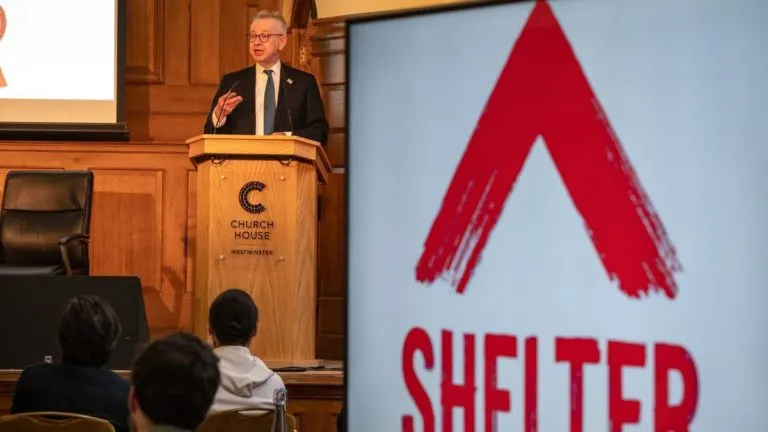The people’s case for the reform of social housing: Michael Gove signs up to Shelter’s mission
Published: by Alastair Harper

I just saw something special. We made some pretty powerful people listen to what this country needs. Not only did they listen, they agreed that we need more social housing – so things might be about to get a bit interesting.
Those of us who have been calling for more social housing have been used to a mixed response from politicians over the years. But not today. We just launched a new report that details exactly how we unlock more social housing. It looks at how the housing tenure we need the most has been made the hardest to actually build.
Even though our polling shows that the public thinks social housing should be the priority for government spending on housing, it is currently the tenure that receives the least. In fact, it currently receives a meagre 8%. We think this should be ten times higher – 80% would help reverse the net loss of tens of thousands of social homes we see every year. We also want to fix the rules that stop social housing from being funded in so much of the country outside London.
Our report also looks at how we rework the rules around land that are legally designed to make it too expensive to deliver social housing. Finally, it looks at how the planning system works and how any changes need to be done in a way that increases social housing supply.
If our politicians listened to this plan we’d see a reset in our housing system, unlocking a new generation of social housing across the nation. But politicians don’t listen, do they? Well, actually. From the launch we had yesterday they just might.
First we heard from former Prime Minister Theresa May, and she didn’t hold back on why we need more social housing.
‘High housing costs are at the heart of failing social mobility,’ she said. ‘Fundamentally, it is a conservative ethos that whether you own your own home or rent in the social sector, residents deserve security, dignity and the opportunity to build a better life. We know our housing system is broken, but the housing crisis in this country began not because of a blip lasting a year or because of a parliament, but because not enough homes were built over many decades.’
She also talked about how social housing should be seen as a conservative value: ‘For too long, my party has been seen in many people’s eyes as the party only of homeownership. Indeed, dare I say it, our policies have too often made it seem that way. But we are the party of decent homes for all, be they people who want to rent their home or to own their own home.’
After Theresa May left the stage the current Secretary of State responsible for housing, Michael Gove, gave his first major speech on housing – and he made it about social housing.
Did he accept the premise that we need more social housing? Well, yes. He said: ‘We’ve reached a situation for a variety of reasons where … the availability of social housing is simply inadequate for any notion of social justice or economic efficiency.’ In fact, he was pretty explicit: ‘The case for social housing … has been made by Shelter for years now. But it’s an argument that has reached not just maturity, but urgency in our political debate.’
He went on to describe – in a way that sounded suspiciously like he might have taken in our argument – how he wanted to fix the balance of support for social housing in government funding, acknowledging the need to rework the rules around the cost of land and ensuring planning changes makes it easier to deliver social housing. In terms of what we need, it seems he has taken on the argument.
In terms of the political ownership of the need for social housing, he was clear: ‘There is a centre left, a centre, a centre right case for social housing. There is a people’s case for reform of social housing – more and better.’
Also, he was clear on the other issues we have been campaigning on, to reform the rights of private and social tenants:
‘The Queen’s Speech does give an opportunity to bring forward the measures that require primary legislation, including those reforming regulation of the private rental and social tenants that will tip the scale in favour of fairness.’
This has made some waves. It’s certainly a big shift from what we’ve heard in the past from politicians. But it doesn’t mean the job is done. What we do know is that we are right – these are the changes that housing needs and the politicians agree. Now we need to see them deliver. You can join us in making sure they do.